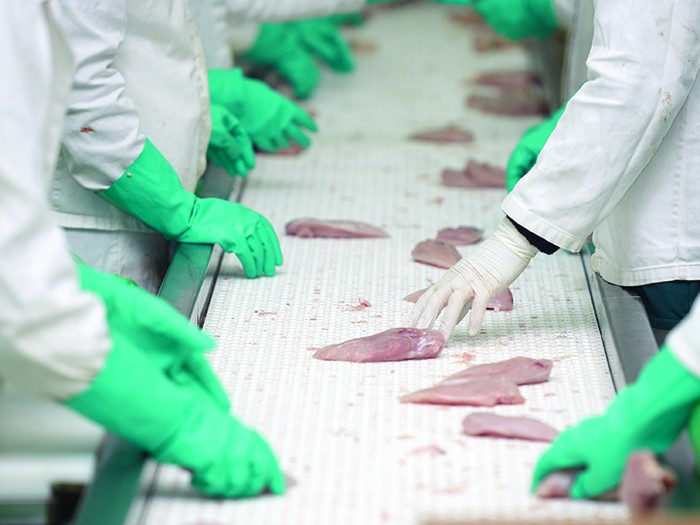Compensation for Worker’s COVID Illness Barred by Exclusive Remedy Provision, Court Decides

Rigoberto Ruiz began employment at ConAgra Foods Packaged Food in 1995 in its meat-packing plant in Darien, Wisconsin. On April 22, 2020, Ruiz contracted COVID-19.
Ruiz was not alone; as many as 100 other ConAgra meat-packing workers contracted the virus in April 2020, and the plant had to temporarily shutter its doors.
Unfortunately, Ruiz passed the virus onto his wife, who later died.
Ruiz blamed ConAgra. According to him, it was the company’s failure to institute proper safety measures that led to his illness and his wife’s death. He filed a wrongful death and survival suit against the company.
Among the allegations, Ruiz said ConAgra requested its employees who exhibited symptoms continue to work. He also alleged the company was aware of at least one employee testing positive before its temporary closure.
Further, he called out ConAgra for its housing situation. Workers who were housed in the company dorm, Ruiz said, passed the virus to their colleagues because ConAgra “failed to properly space out its workers’ sleeping arrangements.”
Added to that, according to Ruiz, ConAgra also did not institute a track-and-trace system or train workers on mitigation strategies, like mask wearing and social distancing, that could prevent the spread of COVID-19.
ConAgra filed a motion to dismiss the claim.
It argued the PREP Act immunizes it from the claims alleged in Ruiz’s complaint. Enacted by Congress in 2005 as a response to the SARS epidemic, the act’s immunity provision was designed to insulate covered individuals and entities from liability for their administration or use of countermeasures to combat a pandemic.
In its conception, the PREP Act was designed primarily to shield the medical community from liability.
To trigger the immunity provision, there must be “a causal relationship with the administration to or use by an individual of a covered countermeasure.”
“Covered countermeasures” are determined by the Secretary of the Department of Health and Human Services. In March 2020, COVID-19 was declared a public health emergency, and the Secretary recommended certain covered countermeasures to combat the virus.
ConAgra was tasked with showing it both qualified as a covered party under the PREP Act and that it implemented the covered countermeasures established by the Secretary.
ConAgra argued through its safety precautions, including handing out facemasks to its workers, it had indeed “administered a program with respect to the … dispensing, distribution, provision, or use of … a qualified pandemic or epidemic product.”
The court reviewed the allegations. It reiterated that in Ruiz’s allegations, ConAgra “failed to exercise ordinary care in its Darien facility which resulted in over 100 of its workers at the plant testing positive in April 2020.”
In sum, because Ruiz alleged “that it was inaction, rather than action,” that caused his wife’s death, the court ruled that the PREP Act’s immunity provision does not shield ConAgra from suit or liability.
ConAgra took a different tactic. In its appeal, the company turned to workers’ compensation law.
The court found that Ruiz’s claims were barred by the exclusive remedy provision of the Workers’ Compensation Act, in which “an employer is liable in workers’ compensation and workers’ compensation is the exclusive remedy for an employee who sustains an injury while performing work incidental to the employment, that the injury is not self-inflicted, arose out of the employment, and both employer and employee are subject to the provisions of the act.”
However, the claims brought against ConAgra by the estate of Ruiz’s wife were a different matter.
The court found that the estate did not meet the required statutory conditions for liability under workers’ compensation and rejected the employer’s argument that the estate’s claims were barred by exclusive remedy, because they flow from the employee’s workplace exposure to the virus.
It asked both parties to submit additional briefs.
Scorecard: The question of compensability for the wrongful death of Ruiz’s wife will be decided at a later date. Ruiz’s claims, however, are barred by the exclusive remedy provision in workers’ comp.
Takeaway: COVID-19 changed our world in innumerable ways, and no one can bring back the ones we’ve lost. But for those who fell ill on the job, there is the possibility to gain somethings back. Companies are best suited to work with employees and have a plan in place to address their concerns and questions as we continue to learn how to live with the virus. &










